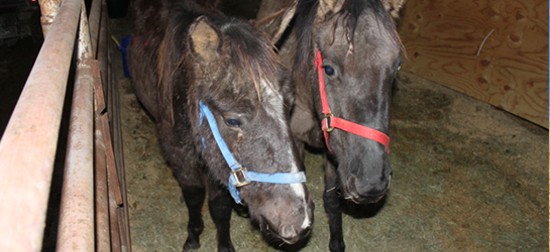Missouri is the No. 1 state in the country for terrible puppy mills -- and very soon could also be home to a horse-slaughter facility.
That's right, the horse-slaughter industry is apparently looking to do business here in Missouri, and animal-rights groups fear that federal inspectors may soon give the necessary approvals.
"It is in every sense of the word cruel," Nancy Perry, senior vice president of government relations for the American Society for the Prevention of Cruelty to Animals, tells Daily RFT. "There's really no way to make horse slaughter humane."
See also: - Humane Society: Missouri Still Has Nation's Worst Puppy Mills - Photos: Animal Cruelty in Missouri and Rescues from Abuse - Undercover Animal Cruelty Videos that Spurred Big Ag's Censorship Crusade
In addition to the basic animal cruelty, Perry says, equine slaughter is wildly unpopular across the country, has a history of causing environmental and economic harms to surrounding communities and unnecessarily drains limited government food-inspection resources.

And horse meat, she argues, is unsafe for human consumption.
The ASPCA is raising awareness about a business called Rain Natural Meats based in Gallatin, which has formally applied with the United States Department of Agriculture for approval of horse slaughter. That application for an inspection references "raw ground" and "raw not ground" meat from equine slaughter. (Daily RFT was unable to reach anyone at the company through a number listed online.)
The USDA gave approval for a grant of inspection last week, the ASPCA notes, and could soon give the green light for the actual horse processing.
An official with the USDA confirms to Daily RFT that the Food Safety and Inspection Service (FSIS) is currently reviewing the application for Rains Natural Meats and says a grant will not be issued until the establishment meets all the requirements of the Federal Meat Inspection Act.
Federal authorities cleared the way last week for domestic horse slaughter in New Mexico, and Department of Agriculture officials reportedly indicated that they would grant similar permits to Iowa and Missouri companies.
There are many reasons to oppose horse slaughter, Perry says.
"It's not in high demand anywhere," she says, explaining that horses are transported very long distances under terrible conditions to processing facilities where they will face a cruel death.
"They are crammed into these trucks...and are moved in ways that often lead to extreme injuries," she says. "That's just considered the cost of doing business."
She says that some can lose limbs and others may die in the process.
"There's really no way to eliminate these cruelties," she says.

Once the horses are taken to be killed they are very resistant, and the method of stunning them can be challenging and violent. "It's very, very difficult to do.... Horses are hit multiple times," Perry says.
In a state like Missouri, she also points out, there are alternatives for horses -- sanctuaries and groups that can rescue them.
Continue for more from the ASPCA and for information from the USDA on horse slaughter.






